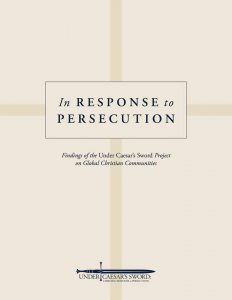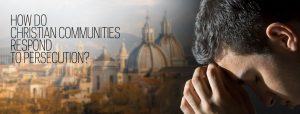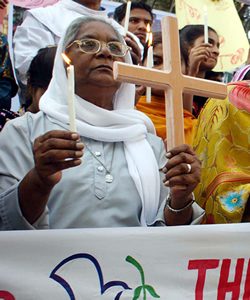
By Ann Marie Foley - 27 April, 2017

Christians are the most widely persecuted religious group in the world according to a new report.
“Christians around the world are being brutally persecuted, facing imprisonment, torture, and even death,” states the University of Notre Dame, one of the partners in the Under Caesar’s Sword global research project and report titled In Response to Persecution.*
The report details the persecution of Christians around the world, but also how they choose to respond to persecution. The three common responses of Christian communities to violence or harassment are “survival”, “strategies of association” and “confrontation”, which is the least common response.
Survival entails communities choosing to remain where they are in the face of persecution, as minorities have in Iraq and Syria, and either gathering covertly for worship, as underground churches do in China, or maintaining a tenuous relationship with regimes in power.
Communities using “association” develop relationships with other non-governmental organisations or international bodies like the United Nations, or strengthen their social ties in their country through social services or practising forgiveness.
Examples of this include the Coptic Christians and Muslims in Egypt, who acted to protect each other’s churches and mosques from vandalism and violence in 2011.
“Christian responses to persecution are almost always nonviolent and, with very few exceptions, do not involve acts of terrorism,” the report stated.
 Several regions are studied in detail in the report. Among them are Iraq and Syria, where Christians have been persecuted on a large scale in the context of civil war.
Several regions are studied in detail in the report. Among them are Iraq and Syria, where Christians have been persecuted on a large scale in the context of civil war.
“In 2016 the US State Department declared that Christians, as well as Yazidis and Shiites, were victims of genocide at the hands of the Islamic State,” the report said.
Christians have been fleeing Iraq since the US invasion in 2003. Before the invasion the population of Christians was nearly 1.5 million. By 2006 it had halved to 700,000. By last year it had gone down to an estimated 400,000. Christians have not remained in Islamic State (IS) controlled territories.
In Syria Christians have also fled. Aleppo has seen more than two thirds of the population of Christians leave. Since 2010 the population has dropped from an estimated 110,000 to 30,000 today. Nationwide the number of Christians present has dropped from 6 per cent of the total population down to about 3 per cent.
The report gives the example of Jesuit priest Paolo dall’Oglio, who had run an interreligious monastery for 30 years in Syria. He was exiled by the Government for a year, and after he returned he was kidnapped by IS and may have been executed (this has not been confirmed).
The increase in Islam in Sub-Saharan Africa has also increased persecution. For example, Boko Haram in Nigeria has destroyed over 200 churches, internally displaced 1.5 million people, displaced around 200,000 people and murdered 13,000 people, as well as kidnapping countless female Christians as sex slaves.
“It is estimated that in 2013 more Christians were killed in Nigeria as a result of religious persecution than in the rest of the world combined,” the report stated.
“The West” is also included in the list of areas where Christians are persecuted, and is defined as including the so-called liberal democracies, many of which have majority Christian populations. They include many Western European countries, the USA, Canada, Latin America and Australia.
“While Christians in the West generally do not experience severe repression, they have suffered increasingly serious curtailments of their religious freedom, particularly with respect to their convictions about sexuality, marriage and the sanctity of life,” the report stated.
It adds that Pope Francis has called these restrictions “polite persecution”. They are motivated by secularism and involve a financial cost to merchants, universities, schools, hospitals and charities as well as to individuals who are fired or fined, threatened with denial of accreditation or eviction from campuses, or barred from living out their convictions.
*The research and report involved a partnership of the Notre Dame Center for Ethics and Culture, the Religious Freedom Institute and Georgetown University’s Religious Freedom Research Project, with the support of the Templeton Religion Trust.